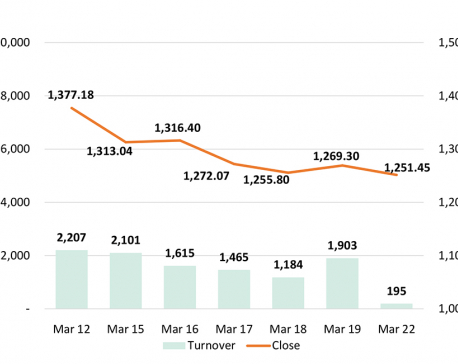
OR
KATHMANDU, Dec 4: A number of commercial banks have been issuing debentures to meet mandatory requirements forwarded by the regulator even though many of them are receiving poor response from investors.
After receiving approval of the Securities Board of Nepal (Sebon), four banks issued debentures worth a combined Rs 8.5 billion in the first four months of the current fiscal year.
Similarly, another five banks have been waiting the regulator's nod to issue debentures worth Rs 12.5 billion, while debentures of two finance companies are also in the pipeline, according to Sebon.
Debentures, also known as corporate bonds, are a debt instrument that companies listed at Nepal Stock Exchange can issue to raise capital. The companies issue low-risk instrument that yields a fixed return for investors, mainly to manage working capital.
While commercial banks are offering returns of 10%-10.35%, finance companies are offering return of 12% annually. The offered rate of return of debentures issued by commercial bank is almost equal to the interest rate on fixed deposits. It is one of the reasons why banks are struggling to sell their credit instruments, say investors.
Tulsi Ram Dhakal, vice president of Nepal Investors' Forum, told Republica that bank debenture is now attracting depositors who wish to be on safe side from fluctuation of interest rate on deposits.
On October 10, Laxmi Bank Ltd issued ‘10% Laxmi Bank Debenture 2086’ worth Rs 2 billion with a maturity period of 10 years. The bank extended the timeline, which was supposed to end in the next five days, to November 8, citing under-subscription. Similarly, Siddhartha Bank Ltd had issued ‘10.25% Siddhartha Bank Ltd Debentures 2083’ in August, targeting to raise Rs 2.50 billion through issue of 2.50 million units of debentures. Prabhu Bank Ltd issued one million units of ‘10.25% Prabhu Bank Debenture 2086’ on November 7-11.
Sunrise Bank floated "10.25% Sunrise Debenture 2083" worth Rs 3 billion to the general public on November 6-10. These banks, however, were able to sell their credit instruments within the stipulated deadline, according to the officials of the respective banks.
The banks waiting for Sebon's nod include Agricultural Development Bank Ltd, Citizens Bank International Ltd, Nabil Bank Ltd, Nepal SBI Bank Ltd and Kumari Bank Ltd.
Nepal Rastra Bank, through the Monetary Policy 2019/20, has made it mandatory for banks to issue debentures equivalent to 25% of their paid-up capital by mid-July 2020. With the new rule in place, commercial banks will be collecting around Rs 64.74 billion through debentures in FY2019/20. There are 28 commercial banks with total paid-up capital of Rs 258.98 billion as of mid-October, according to the NRB data.
The policy taken by the central bank aims at managing lendable funds to meet the growth target of the government via monetary and financial measures. The new arrangement is expected to help ease the shortage of lendable fund in the banking system and lower skyrocketing interest rates.
According to the central bank officials, banks will not have to include debentures in the core capital plus deposit (CCD) ratio, allowing them to disburse all the funds collected through debenture schemes as loans.
Ashok Sherchan, CEO of Prabhu Bank Ltd, told Republica that many banks are opting for debenture as an instrument to collect funds as part of their efforts to address the shortage of lendable fund by reducing their reliance on deposits as the source of funds. “Apart from the regulatory obligation, we are issuing debentures also as a supplement to the secondary capital. As the money collected out of the issuance provides funds free from the regulatory obligations such as the cash reserve and CCD, among others, banks are attracted to manage the lendable fund via debentures issue,” said Sherchan, adding that his bank's debentures received good response from the buyers.
According to Sherchan, the money collected in debentures also ensures long-term funds for the banks than the ones managed through deposit collection. “That is why are preparing to float additional debentures with maturity of eight years,” he added.
You May Like This

Stock market to remain closed for five days
KATHMANDU, March 23: The Securities Board of Nepal (Sebon) has instructed Nepal Stock Exchange (Nepse) to shut stocks transaction from... Read More...

Nepse ends 18 points lower
KATHMANDU: The local bourse witnessed one of its most bland trading sessions as associations of merchant banks and stock brokers... Read More...

Sebon mulls extending daily trading hours
KATHMANDU, Jan 16: The Securities Board of Nepal (Sebon) mulls to increase the daily trading hours of stocks at the... Read More...




Just In
- Partly cloudy weather likely in hilly region, other parts of country to remain clear
- Nepal’s Non-resident Ambassador to Italy presents Letter of credence to President of Italy
- 104 houses gutted in fire in Matihani (With Photos)
- By-elections: Silence period starts from today, campaigning prohibited
- A Room of One's Own- Creative Writing Workshop for Queer Youth
- Tattva Farms rejuvenates Nepali kitchens with flavored jaggery
- Evidence-Based Policy Making in Nepal: Challenges and the Way Forward
- Insurers stop settling insurance claims after they fail to get subsidies from government














Leave A Comment